In Hollywood, if a film establishes a commendable paradigm for its desired genre then it's a common option to "go back and rehash it". Following the success of the first Beverly Hills Cop the producers spent some time endeavouring to turn the prize-winning concept into a TV series. When confronted with an unfortunately unenthusiastic reception from key cast members, the decision was finally made to just create another film. Hence, Beverly Hills Cop II was reeled out only 3 years after its predecessor's wild box office success. Luckily for the filmmakers, all of the crucial cast members were available to reprise their roles.
Eddie Murphy returns as the foul-mouthed Detroit cop Axel Foley. Who else could portray this role? Also featuring in the cast are John Ashton and Judge Reinhold as Beverly Hills policemen Taggart and Rosewood. Once again the interaction between these two is a delight to watch, although the two are less delineated in comparison to the first film. Director Martin Brest forfeited the director's chair, so the duties fell into the lap of Tony Scott - the man who helmed Crimson Tide and Top Gun among others. However, new director Tony Scott is more comfortable with action and less comfortable with dialogue and humour. Martin Brest was completely the opposite. Hence, Beverly Hills Cop II is a disappointing action puff piece with precious little comedy. Scott places the emphasis on a darker shade of violence, which is positioned awkwardly with the witty dialogue and localised satire.
The plot of the movie is confusing and convoluted. The team of screenwriters (including Murphy himself) create a wafer-thin plot that in the long run is just an excuse for violence and laughs. Basically, the film finds Axel Foley (Murphy) investigating a string of unsolved robberies that could be connected to the attempted murder of a Beverly Hills policeman. Although ill-advised, Axel enlists the aid of his good pals Taggart (Ashton) and Rosewood (Reinhold) and the three begin to bend a few rules to solve the case which leads to some confusing mumbo jumbo regarding gun smuggling that is somehow connected to a race track. As a reaction to the protagonists bending the rules, the script appears to be excessively fond of the customary melodramatic 'end of career' threats. It's merely a dumb action vehicle, but surely policemen are not threatened with the sack every single time they get something wrong. In this film we have suspensions, demotions, sackings and threats seemingly every few minutes. The story is as tortuously long-winded as it sounds, and then some!
The central flaw of Beverly Hills Cop II is its treatment of characters. All credibility is thrown to the wind at the beginning when there's discussion of a fishing trip. Are these the same guys we saw in the first movie?! Murphy's Axel Foley is almost his same old foul-mouthed, fast-talking self but there are a few odd alterations. Aside from that, both Reinhold and Ashton suffer from unnecessary changes. Tony Scott opts for style over substance, but his visual flair cannot overshadow the dreadful plot building. It's extremely hard to follow as well. With each new lead, the audience are left oblivious as to what is actually occurring! This film is just noisy action fluff, flaunting Eddie Murphy in fine form and some impressive ideas. The action is well-crafted despite not much point to most of it.
Overall, Beverly Hills Cop II is never close to matching its predecessor. The main star, Eddie Murphy, is just as charming but there isn't much for him to work with. New director Tony Scott is allowed the opportunity to have some fun with the set pieces: concocting invigorating chases shot with the copious sheen that was the trademark of uber-producers Don Simpson and Jerry Bruckheimer. With more laughs and less unnecessary action there could have been something far more satisfying in the can. It's also annoying that this is an hour of nostalgia...characters from the first film are granted some minor screen time. This film will be devoured by action fans; however, it won't be taken kindly to those who loved the appeal of the original. Followed by Beverly Hills Cop III.
5.6/10
Disappointing sequel...
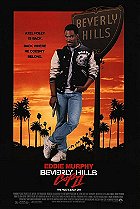 Posted : 16 years, 11 months ago on 12 July 2008 03:36
(A review of Beverly Hills Cop II)
Posted : 16 years, 11 months ago on 12 July 2008 03:36
(A review of Beverly Hills Cop II) 0 comments, Reply to this entry
0 comments, Reply to this entry
Impeccable mix of comedy and action!
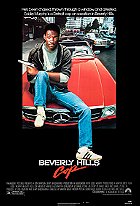 Posted : 16 years, 11 months ago on 12 July 2008 03:21
(A review of Beverly Hills Cop)
Posted : 16 years, 11 months ago on 12 July 2008 03:21
(A review of Beverly Hills Cop)
Beverly Hills Cop is possibly Eddie Murphy's most popular flick - a deft, witty combination of hilarious laughs and violent action. The film admirably stands out for its excessive energy, clever repartee, and sharp-tongued wit (compliments of star Murphy, who was originally a successful live comedian). For most of its pre-production period, the film was scheduled to be a dead straight, all-out action film with Sylvester Stallone as the title character (everyone from Al Pacino to Arnie had been circling the project, eying the lead role). However, the studio heads were concerned about the rising budget costs as additional action sequences were added to the script. Eventually the plug was pulled, and Stallone stepped away gracefully.
With a few weeks left until production was scheduled to commence, Eddie Murphy stepped into the title role and the film underwent massive script re-writes as the genre was altered to comedy/action. The action scenes were toned down, instead replaced with comedy and clever character interaction. Everything came together perfectly, mainly to the credit of its title star who brought fantastically witty humour to the production. Director Martin Brest once described his fondness for improvisation on the set. Due to Murphy's outstanding skill in stand-up comedy, heavy improvisation resulted in far more laughs. Interestingly, the heavy script re-writes can be easily spotted - but not as flaws, in fact the film's charm derives from the lack of clichés: no love interest despite the presence of a female lead (in the Stallone script version it was a typical love story that develops in two days), no pointless racial jokes (Axel Foley was initially a white man), etc.
Beverly Hills Cop has a thin revenge plot that seems to be an excuse for foul-mouthed Eddie Murphy humour and some entertaining action. Detective Axel Foley (Murphy) works for the Detroit police department and is in big trouble following unauthorised undercover work (and consequently being severely berated by his boss). One night, Axel unexpectedly runs into an old friend - Mikey Tandino (Russo), who was his partner in crime many years ago. However, Mikey is in possession of suspicious German bearer bonds that are the cause of his imminent murder. Axel seeks revenge, but his boss won't let him touch the case. Instead he opts for an early vacation...to Beverly Hills where Mikey formerly lived. As Axel begins his investigation, he's arrested by the Beverly Hills police who find his foul-mouthed attitude rather offensive. We soon meet another trio of supporting characters: Detective Billy Rosewood (Judge Reinhold), Sgt. Taggert (John Ashton), and Lt. Bogomil (Ronny Cox). After much scepticism and hesitation, they unite with Axel to solve the case.
The thin plot soon disappears in the gags and action; however Beverly Hills Cop is extremely entertaining viewing. The film became a terrific box-office accomplishment and is considered by many as the defining moment in Eddie Murphy's career. While his career has seen its ups and downs over the years, he is stunning in this film; from his winningly mischievous smile as Axel to his superbly over-the-top gay male hustler "Ramone". Murphy is the film's driving force and he's impeccable with each line delivery. Never is a false note struck. His character of Axel Foley is tough, cool, quick-witted, sarcastic, and likable - one of cinema's most enduring characters and certainly one of the best law enforcers in cinematic history. There is also a remarkable supporting cast to boot; featuring the marvellous duo of Judge Reinhold and John Ashton as Beverly Hills cops. Together the three have great chemistry. They're easily likeable, credible and their interactions are frequently side-splitting. Also watch out for Bronson Pinchot as the memorable Serge - he is only on the screen for a criminally small time, but he will make an impression that will last far longer.
Beverly Hills Cop is perhaps best known for its amazing music! It's a faultless blend of techno-pop and electronic rock - the movie's renowned theme is energetic, rambunctious and fun. For a genre-defining buddy comedy/action, it's simply incredible at the low amount of clichés and conventions that would later emerge frequently in films to follow. Even so, there are a number of full-on action movie clichés that remain in place: the enemies can't shoot to save their life, the heroes can shoot with perfect accuracy, really dumb cops are abundant (with the exception of the title character), overbearing police rules, Axel Foley's dumb methods of investigating (breaking and entering illegally) and heroes survive getting shot while their enemies are easily dispatched with a single bullet. Oh well, it's easy to overlook these flaws for entertainment.
Overall, Beverly Hills Cop provides great, brutal, entertaining action with plenty of laughs to boot! The film moves at an amazing pace, and it leaves you wanting much more. You will learn to love the characters and their snappy dialogue. The film exceeds beyond anyone's expectations. With current filmmakers producing watered-down comedy/action flicks, it's fantastic to revisit these old gems that defined the genre and proved to be an example of the genre done correctly. The film is one of the best action/comedy films you will ever see, with star Eddie Murphy in his prime backed up by a brilliant supporting cast, droll dialogue, lively soundtrack and crisp editing. You cannot afford to miss this one! Followed by Beverly Hills Cop II.
8.3/10
 0 comments, Reply to this entry
0 comments, Reply to this entry
Mesmeric...entrancing...and boring!
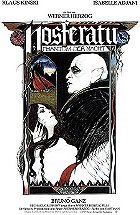 Posted : 16 years, 11 months ago on 11 July 2008 02:50
(A review of Nosferatu the Vampyre)
Posted : 16 years, 11 months ago on 11 July 2008 02:50
(A review of Nosferatu the Vampyre)
It's an unfortunate fact that remakes have been commissioned for decades. Back in 1979 Werner Herzog set out to remake the unauthorised 1922 Dracula adaptation Nosferatu, which was directed by F.W. Murnau. The original 1922 silent movie will forever remain an essentially flawless horror classic. When Herzog decided to remake Murnau's masterpiece, it's obvious that he made a creative decision to stay more faithful to the source material written by Bram Stoker in the late 19th century. Originally, Murnau desired to make a cinematic version of Stoker's novel. However, due to copyright reasons, he was unable to fulfil this desire. Instead he made "cosmetic" changes to the novel (mainly changing the title from Dracula to Nosferatu) while keeping the original concept and essential series of events identical to the source material.
Herzog's remake is a courteous re-imagining of Murnau's early silent picture. This remake is neither scary nor brutal as most vampire-oriented horror pictures tended to be in later years. Herzog's movie is instead moody, mesmeric, and entrancing: it's inexorably sinister and spellbinding as the vampiric Transylvanian fiend spreads corruption and pestilence, fundamentally generating a pervading atmosphere of malevolence as opposed to outright horror thrills. Imagery of the town devastated by an unknown plague town is particularly memorable. However, Herzog's filmmaking techniques strictly fall into the category of "art house" and certainly won't be liked by all.
The film's plot remains faithful to its film forerunner as well as the original novel. Jonathan Harker (Ganz) works for a local real estate agency. Harker's employer sends him on an errand to stitch up a property deal with the enigmatically frightening Count Dracula (Kinski) who resides in the mysterious Transylvanian mountains. During Harker's expedition to Transylvania he discovers that the locals hearing the name Dracula is enough to build up anxiety, fear and trepidation. The locals are so terrified of Dracula's castle that no-one agrees to help him reach his desired destination. However, due to the promise of a substantial pay-check, Harker doesn't give up as he travels through the baffling, mesmerising landscape. Count Dracula transpires to be a bald man with a perplexingly disturbing personality underneath. Dracula is a man who perks up at the sight of blood...and at the sight of a photograph depicting Harker's striking wife Lucy (Adjani). Harker is left weakened and sapped of a lot of blood while Dracula sets forth for his new residence in search of Lucy. Dracula brings with him plague and death.
Werner Herzog's Nosferatu the Vampyre is slow-paced and a seemingly cumbersome film. This rendering of the classic vampire tale is simply one of the most stylish in existence. Herzog filmed his version across dazzling, extraordinary landscapes throughout Europe. The visuals also benefit from superb production design and excellent cinematography...everything is quite a treat to view. However there are countless flaws to also point out. Dramatically the film is exceedingly boring, as the slow pace is accompanied by mannered acting all-round. Perhaps this was intended to provide a dream-like quality to the proceedings, and in some ways it is quite successful. The stilted, unimaginative dialogue also drags the production down.
Klaus Kinski is an interesting embodiment of the Dracula character. Kinski portrays Dracula quite similarly to the Max Schreck depiction in 1922. His appearance is cadaverous, ghastly and almost rodent-like. His features are extremely distinguished, especially during dialogue or horror scene. Kinski is duly creepy and endows his portrayal with additional sympathy. He is what he is and can't help it, and it's palpable that he feels sorry for himself. He is a melancholy creature, discontented with his perpetually despondent condition yet unable to do anything about it. Nosferatu the Vampyre is a competent, atmospheric remake that has been regarded as one of the most faithful Dracula adaptations of all time. But, considering the quality of Murnau's masterwork, it isn't overly necessary.
6.2/10
 0 comments, Reply to this entry
0 comments, Reply to this entry
Not this time, Jerry
 Posted : 16 years, 11 months ago on 10 July 2008 12:40
(A review of Bee Movie)
Posted : 16 years, 11 months ago on 10 July 2008 12:40
(A review of Bee Movie)
In a contemporary cinematic age dominated by animated films such as Ratatouille, Shrek, Surf's Up and Finding Nemo among countless others, Bee Movie is unfortunately a tremendous disappointment. Even more tragic is that it marks the first major project since Jerry Seinfeld's long-running TV show came to an inevitable conclusion. No-one would have expected Seinfeld to make his return to the screen with an animated children's film, but regrettably that's how things transpired. Jerry Seinfeld has pretty much flown beneath the radar until Bee Movie which was written and produced by Seinfeld, as well as featuring the actor as the chief voice talent. Standard for an animated production, the film achieved an admirable box office sum and earned well over $100 million. Considering the main person involved in Bee Movie, it's pretty safe to assume that much of its success was due to the return of Seinfeld to the screen and his fans that desired more Seinfeld humour in their system.
The central character of the piece is a small bee named Barry B. Benson (voiced by Seinfeld): a college graduate whose about to join the workforce where he will remain until death. After a tour of the local honey factory, Barry reaches the conclusion that he doesn't wish to conform to the usual bee tradition of choosing the customary job of a position in the Honex industry that manufactures honey. Instead Barry opts to join the 'pollen jocks' who venture out of the hive and into the human world in search of pollen and nectar. However this journey into the outside world proves to be far more dangerous when he inadvertently gets involved in a tennis match, and meets quirky young florist Vanessa (voiced by Zellweger). Barry breaks the cardinal rule of beeing a bee (excuse the obvious pun/spelling error): don't talk to a human. He begins rebelling against the customary bee laws, but this rebellion takes an unlikely turn when he realises humans are exploiting bees for their honey for the worldwide market. Barry takes it upon himself to take legal action against the humans and free his fellow bees from oppression.
Bee Movie comes from the same studio that brought the world the amazing animated film Shrek. At times, it's hard to evoke this thought. On the one hand the film looks very cute: the animation is solid, the production design is creative and the laughs are cute. Unfortunately, despite all this the film suffers from a weak storyline that is so quintessentially Seinfeld that it's a wonder why it never surfaced in his TV show. There are also dreadful problems with the script. Seinfeld launched his career with a TV show that earned his masses of adult fans. Understandably, adults are going to want to see the triumphant return of the man. However the film cannot find its audience. The script is too watered down for the adults (to attain a G rating for maximum box office profits), while the jokes are generally too adult-ish for the kids to comprehend! After the kids have a giggle at the novelty of bees talking, they'll be lost in their search for something else they may find slightly amusing. The best animated films stock quality laughs for different audiences. With Bee Movie, the laughs are aimed squarely at adults who will be bored at the watered down language and the pretty routine situations customary for an animated film.
Admittedly, there are a number of quality laughs that slightly overshadow the weak storyline. Many of these laughs are attributed to the amazing actors in the cast. Chris Rock, Renée Zellweger, Matthew Broderick, Patrick Warburton, John Goodman, Kathy Bates, Barry Levinson and several others are part of the film's voice cast. However many of these actors are criminally underused. Chris Rock, for example, is featured twice. His scenes are absolutely side-splitting...and yet he's allocated about 4-5 minutes of screen time. John Goodman's quirky lawyer is another underused character. Basically everyone except for Jerry Seinfeld is underused. Hardly surprising though, because Seinfeld did write the script himself. With so many big names and minimal screen time for all of them, there doesn't appear to be much of a point, does there? Even worse, the movie probably won't appeal much to adults who would recognise the voices, because the film is reasonably customary and predictable. If you're a fan of Jerry Seinfeld's unique deadpan humour, that's precisely the humour we get. Yet it isn't the same in a cartoon, where the characters appear to lack any expression or animation (excuse the intended pun). Only Chris Rock and John Goodman seem to deliver any expression at all. The other voices are virtually interchangeable. You could place a different actor in each role and the film would be about as funny.
In defence of the film, there are a few commendable messages pertaining to being one's self, being tolerant of others, being accepting of other people's ideas, and seeking personal independence. And I did smile on multiple occasions. The humour is watered down, but there are a number of memorable laughs that are extremely easy to quote. The appearance of Winnie the Pooh is a key scene that I'm referring to. Also Chris Rock's line regarding lawyers...that's all very funny; however this quality is never sustained enough to conceal a disappointing plot branched off a superb concept. Bee Movie simply cannot hold its desired audience because its desired audience is never clear! Both the kids and adults may find a few laughs, but in between these laughs they'll be staring at their watch, wondering when it will be over. That's a bad sign when we're talking about a brisk 90-minute animated film!
5.3/10
 0 comments, Reply to this entry
0 comments, Reply to this entry
A seminal sci-fi action masterpiece
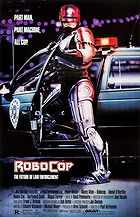 Posted : 16 years, 11 months ago on 9 July 2008 04:35
(A review of RoboCop)
Posted : 16 years, 11 months ago on 9 July 2008 04:35
(A review of RoboCop)10/10
 0 comments, Reply to this entry
0 comments, Reply to this entry
British cinematic brilliance...
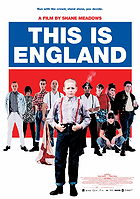 Posted : 16 years, 11 months ago on 9 July 2008 08:34
(A review of This Is England)
Posted : 16 years, 11 months ago on 9 July 2008 08:34
(A review of This Is England)
Of the existing generation of British filmmakers, talented director Shane Meadows is indisputably one of the most confrontational and forthright. The talent of Meadows is in the impressive films he continually creates. Meadows' creations can be gut-wrenching experiences; however in other films he demonstrated that he possesses the aptitude to challenge an audience on an emotional level. Those who've witnessed his 2004 film, Dead Man's Shoes, can definitely testify to this perspective.
This Is England is his latest work and marks an especially personal film for Shane Meadows. A great deal of the story is sourced from his former association with skinhead posses in the early 1980s. A staggering extent of authenticity has been accomplished not only through admirable production design, make-up and costumes - but moreover the skilful utilisation of stock footage and music originating from the period in which the story is set. This Is England opens with an assortment of stock footage concerning the Thatcher era and particularly the war in the Falklands. This instantaneously establishes the film's mood and institutes an atmosphere of conflict and ambiguity. Filmmakers Meadows makes it comprehensible that this isn't a movie about nostalgia...this is the 1980s as an aching, anguished, heart-rending memory. This Is England is a gripping film regarding a boy's pursuit for acceptance after the unfortunate death of his father. True to his typical filmmaking elegance, writer/director Shane Meadows pulls no punches. There are several scenes that viewers will find extremely confronting. British cinema hasn't been this remarkable since Danny Boyle's Trainspotting over a decade ago.
This compelling drama is centred on a young boy named Shaun (Turgoose) who lives with his mother (Hartley) in the Midlands of England. It becomes clear soon into the film that Shaun is struggling to deal with the catastrophic bereavement of his father who tragically died in the Falklands war, while also enduring the unremitting torment of school bullies. On Shaun's final day of the school term he is bullied severely by a bloke at school. Subsequent to this school day, Shaun is walking home alone when he inadvertently stumbles upon a small group of skinheads. Woody (Gilgun), the group's leader, takes an instantaneous shine to Shaun and offers him support with his troubles at school. Soon enough, Shaun meets the rest of the group and becomes a popular new member. The group provides the troubled young Shaun with the fatherly guidance and security that he severely craves.
The gratification of the group is unexpectedly interrupted by the return of Combo (Graham) following a stint in prison lasting several years. Combo silently took the blame for Woody years before, and immediately recommences a prominently authoritative role within the gang. But Combo's phase in prison also realigned his social and political stance. Combo addresses the group on what he anticipates will be their next phase, but his aspiration to have everyone engrossed in this racial hatred results in the splitting of the group. Young Shaun chooses the radical path after Combo instils in him an impression of misplaced patriotism. Combo perceives great promise in Shaun and treats him as a son. Shaun is offered Combo's abiding support and loyalty. As the fostering of racial hatred persists, Shaun is unexpectedly challenged with a situation that sincerely questions the ethical issue of a discordant and violent lifestyle that has befallen him. At a tender young age of 12, Shaun takes a mature evaluation of his life and of those who seek to nurture him.
This Is England is a truly extraordinary film permeated with uncompromising messages of the period and controversial viewpoints pertaining to the 1980s political situation. Meadows is capable of combining comedy and drama impeccably; there are great subtle laughs, but the film's jolts arrive with the strength of a kick to the head. Everything from the directing to the acting is first-rate. Typical for a Shane Meadows flick, the film is infused with infectious dialogue and fully-fleshed characters, although one of the film's principle attributes is that of Danny Cohen's cinematography that proficiently manages to encapsulate the bleak feeling that was evident of the time. Cohen's photography is both gritty and dour...with an impeccably set atmosphere.
The cast is lead by the astonishing Thomas Turgoose who smoothly expresses the assortment of diverse emotions the material calls for. Through intense workshopping, Turgoose has fashioned the character of Shaun through his own experience as much as director Shane Meadows'. Pinch-faced and awkward but brimming with prepubescent swagger, he's the film's shining centre and it'd be impossible to see a superior, more naturalistic child performance in the next few years. Special recognition must go to Stephen Graham as the vicious skinhead Combo. His dialogue is littered with profound uses of swearing and filthy scatological terms. The whole film builds up his overwhelming rage that is released on screen in an unforgettable few moments. The most haunting aspect of the film is its music. It's remarkable, unforgettable and is tweaked to absolute brilliance. The filmmaking cannot be faulted at all.
Overall, This Is England is an absolutely brilliant movie. Gritty, compelling, tragic yet funny - Britain has never exported a film of this perfection since 1996 when Danny Boyle made his mark on cinema with Trainspotting. Once again writer/director Meadows has set a precedent for British filmmakers and has obscured many of his filmmaking contemporaries. This Is England may not make for comfortable viewing but it is cinema at its best. The film is challenging, stimulating and confronting...this film cannot be missed at any cost.
8.9/10
 0 comments, Reply to this entry
0 comments, Reply to this entry
Cinematically innovative, and extremely funny!
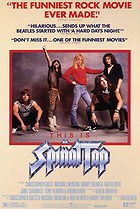 Posted : 16 years, 11 months ago on 8 July 2008 11:27
(A review of This Is Spinal Tap)
Posted : 16 years, 11 months ago on 8 July 2008 11:27
(A review of This Is Spinal Tap)
Rob Reiner's celebrated "rockumentary" This is Spinal Tap is an eccentric, innovative cinematic creation that justifiably generated its own individual genre. The film rapidly reached its cult classic status and is still held in extraordinarily high regard over 20 years since its initial release. It's fascinating to note that the filmmakers wanted people to believe the film was an authentic documentary on a real-life British band. The potency and realism easily allowed an audience to genuinely believe this desired objective. When this film was originally screened to a room of British press, those conducting the screening handed out biographical notes on the fictional band. These notes were complete with priceless intimate details to create an elevated authenticity. Seeing as much of the film's cast originated from US sitcoms, lacking any fame in the UK, it was distressingly unproblematic to accept the "rockumentary" (and Rob Reiner in his Scorsese beard as "filmmaker Marty DiBergi") as wholly legitimate. This film was even taken so seriously that those present started speculating about why they hadn't previously heard of the band that the film was exploring. However, the truth became extremely obvious when amiable old Patrick Macnee showed up in a cameo performance as a chairman of Polymer Records. Nevertheless, the press were extremely impressed with the made-up documentary of extraordinary brilliance they were watching.
This is Spinal Tap ostensibly exhibits itself as a genuine documentary. But due to its fictional central characters, it falls into an entirely different category: mockumentary/rockumentary. A filmmaker named Marty DiBergi (played by director Reiner) decides to visually document a tour through the eyes of the world's loudest rock band: Spinal Tap. Although people want you to believe it is real (everyone will go through that stage due to its realism), the movie is in reality a piercing satire and spoof of the entire rock 'n' roll scene, passing itself off as a real documentary of an existent band. Uproarious behind-the-scenes footage is combined with faux-concert clips that are provided to offer profound insight into the personal lives and loves of each band member. What makes the group seem so real is in the electrifyingly realistic performances from an enormous cast. Combine these performances with the cinema verté (i.e. hand-held camera) style of filmmaking, and the result is marvellous to behold.
This is Spinal Tap is not only funny but extremely cinematically innovative; borrowing elements from factual rock documentaries and spawning an original genre...an entirely unsullied method of telling recognisable stories. Rob Reiner, playing the fictitious filmmaker Marty DiBergi, is given a few minutes at the beginning of the film to introduce the documentary. During these few minutes he explains his motivations: an objective to portray the look, feel and smell of behind-the-scenes with a touring popular rock band. This goal has been fulfilled. Reiner cleverly satirises the situation, employing a high level of poignancy and realism without inflating the truth to hyperbolic proportions. Even with such capable realism in place, there are subtle laughs aplenty. Fans of the film continually laugh at the sheer stupidity exhibited by the characters. Their stupid motivations and philosophies are embarrassingly pathetic, not to mention song titles and even a short segment at the beginning when we hear hysterically funny (negative) reviews of previous albums released by the made-up band.
The film's nature became highly influential. Whenever a biopic is released there are elements that were obviously influenced by this classic rockumentary. Even movies such as Oliver Stone's The Doors explicitly pay homage. The band members themselves are introduced and interviewed one at a time. They are depicted backstage at a gig, in their hotel rooms, travelling in limos, signing autographs, etc. There is one thing that is permanently apparent: they are amongst the most clueless, oblivious people on planet Earth! As an example, one of the band's principal nuisances on tour is fathoming how to devour the hors d'oeuvres they're served at parties. To be expected, I mean how can one possibly get those enormous pieces of luncheon meat onto those little, minuscule pieces of bread? Understandably they commence panicking. They also find themselves hopelessly lost on their way to a stage and consequently wander around in an auditorium's basement for what seems like hours. It's amusing that the band, Spinal Tap, sound quite awful. It's obvious that they're supposed to sound awful, but part of the joke is that they don't sound overwhelmingly dissimilar or any poorer than a thousand other actual rock bands. One of the greatest aspects of This is Spinal Tap is in its portrayal of the cock-ups that continually unfold during a tour. The filmmakers insert such authenticity that it feels like the real deal, thus when some major stuff up occurs it's easy to laugh. For instance, at one stage the backstage crew struggle to release a band member from his plastic cocoon so he can play on stage...then when the song is over it finally pries open. It's this simply unparalleled charm that makes this film so distinctive and memorable.
Overall, This is Spinal Tap is rightfully regarded as an influential cult classic. You don't have to like heavy metal music in order to like the film. In fact, it probably helps not to like the music in order to appreciate the satire more. Although the charm and ingenuity runs thin towards the end (the trouble with essentially every comedy ever created), it's an extremely funny, creative and groundbreaking production that's certainly worth a look and a listen. This film subsists as the ultimate example of the rockumentary genre. Some will love it, some will hate it, but it cannot be denied that the film is a tremendously clever gem helmed by forever remarkable director Rob Reiner.
7.9/10
 0 comments, Reply to this entry
0 comments, Reply to this entry
An exemplary remake!
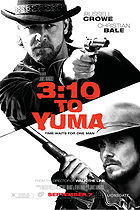 Posted : 16 years, 11 months ago on 7 July 2008 03:55
(A review of 3:10 to Yuma)
Posted : 16 years, 11 months ago on 7 July 2008 03:55
(A review of 3:10 to Yuma)
In this current generation of cinema, hardly any people remember Delmer Daves' classic 1957 western film 3:10 to Yuma that was based on a short story by Elmore Leonard. This is an extraordinarily rare occurrence when a remake actually outshines and surpasses the original in every aspect. In a sense, James Mangold's 3:10 to Yuma symbolises a glimmer of optimism for the future of cinematic remakes. For years, Hollywood has persistently remade classic films with completely catastrophic consequences. Mangold's film also signifies a new Hollywood generation for the western genre. In 2005, Australian filmmakers reinvented the genre with The Proposition. Although this film cannot improve on the Australian production, this is a western for the history books. Critics have praised this movie as the best western since Clint Eastwood's Unforgiven (which collected the Best Picture Oscar back in the early 1990s). There can be no dispute: 3:10 to Yuma is a riveting western abundant in underlying psychological messages analogous to those present in the original. Most commendably, this remake avoids replicating the original. As an alternative the script employs roughly 30% of the 1957 film. The rest of the script builds deeper characterisations in the protagonists, and stretches out the plot for a more expanded running time of about 120 minutes (as opposed to the original's 90 minutes). Normally this could be disastrous, however to the credit of those involved the additions don't feel fabricated: they feel natural and completely fitting in this version of the story. Kudos to director Mangold for maintaining the conflict and central spirit of Daves' original, while still managing to accommodate a fairly serious expansion of a terrifically original story.
3:10 to Yuma is a character-driven western fuelled by astounding performances. The seemingly never-ending string of exposition pays off when the action kicks in. These are possibly the most intense, riveting, stimulating western action scenes the genre has ever seen. Mangold has always been a completely focused director; confident and proficient behind the camera, determinedly manufacturing fine results. The technical aptitude is palpable in all filmmaking aspects. Mangold and cinematographer Phedon Papamichael produce the amazing visuals that are assisted and complimented by the accomplished sound mix: ear shattering sound effects for the gunshots amalgamated with silent but effective music composed by Marco Beltrami. The music isn't overbearing to the point of distraction like a majority of modern action movies; instead it's subtle, exciting, powerful and artistic. The production values are a marvel to behold. A modern western will of course appear completely authentic in terms of props and costumes, and this is no exemption. The period is depicted with brutal honesty and an astronomical level of legitimacy. This portrayal will essentially transport you back to the represented time period for the film's duration. The absorbing drama mixed with this authenticity will suck you in from start to finish.
In this remake of the 1957 film, the plot remains virtually untouched. The difference is in the storytelling and the plot progression. Ben Wade (Crowe) is a notorious outlaw with a solid reputation for robbing and murdering. After Wade robs a stagecoach, he is arrested by the law and held prisoner. Rancher Dan Evans (Bale) heads into town to clarify concerns pertaining to the sake of his land when he beholds the closing events of the stagecoach robbery. Shortly thereafter, Evans is offered an immense amount of money to be among those escorting Ben Wade to the town of Contention where he will be placed on the 3:10pm train to Yuma. Once the train reaches its destination, Wade will be incarcerated. Evans' calamitous endeavour to transport Wade to the train station is in part an effort to save his land but also a component of an internal conflict to determine whether the man can prove to be more than a mere naïve rancher in the eyes of his impulsive and gun-slinging young son William Evans (Lerman). The transport to the town of Contention is perilous and overflowing with ambushes by Indians, pursuits by Wade's rancorous gang and Wade's personal manipulative and surreptitious conduct that makes the journey far more intense.
As I previously stated, 3:10 to Yuma is driven by the remarkable performances from an outstanding cast. Russell Crowe proves that he is still among the greatest actors of this generation. Crowe makes the role of Ben Wade his own. The character is endowed with additional depth in this remake, as opposed to the slightly underdeveloped outlaw in the original. Christian Bale also brings tremendous depth to the character. His version of Dan Evans is a lot stronger than the Van Heflin portrayal in Daves' 1957 version. There's excellent hostility leading to chemistry as Bale's humourless stoicism is jabbed for feebleness and mercy by Crowe's jovial, joking outlaw. Character notes are sufficient - like Dan's necessity for the approval of son William, and Ben's early abandonment - for a density that compels us to be concerned. The taut script never bogs in unnecessary analysis or sentimentality. All characters are pampered with the brutal reality from the period.
Both Crowe and Bale submit dynamite performances and execute a fine job of playing cowboy. Each actor creates depth to his character, and when you insert convincing western action, intelligent dialogue, and elegant cinematography it produces a strong western film for the ages. It's interesting to note that the evil is not drawn from Crowe's Ben Wade. Instead, Wade's motives are kept clouded with mystery until the finale while hinting that there might be a heart in him after all. The evil in the film is drawn from Ben Foster's Charlie Prince: a man who leads Wade's gang to the town of Contention for the irrevocable final stand-off. The brilliant acting never permits you to grow bored. The film is gripping and stimulating, eventually ending in an ultimately perplexing conclusion that avoids duplicating the somewhat conventional conclusion offered in the original.
Overall, 3:10 to Yuma is an extraordinarily rare event when a remake is superior to the film that spawned it. Delmar Daves' 1957 flick is still a brilliant western on its own merits, whereas James Mangold's remake improves the original in every aspect of filmmaking. 3:10 to Yuma is one of the finest westerns of this era. It's indeed an infrequent event when two groundbreaking westerns are created in the course of a few years - in this case The Proposition and 3:10 to Yuma - that rival the last truly brilliant western that was Clint Eastwood's Unforgiven. Perhaps this film represents a new Hollywood era for westerns. The filmmakers remind the audience that westerns are about old-school, gritty action scenes built around some amazing character development. This film is simply far too brilliant to miss: an enduring story that offers first-class acting, heart-racing action, mind-blowing stunts and filmmaking of the highest order.
9.2/10
 0 comments, Reply to this entry
0 comments, Reply to this entry
An all-time classic western!
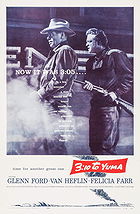 Posted : 16 years, 11 months ago on 7 July 2008 03:38
(A review of 3:10 to Yuma)
Posted : 16 years, 11 months ago on 7 July 2008 03:38
(A review of 3:10 to Yuma)
3:10 to Yuma maintains the tradition of brilliant 1950s westerns. People such as Gary Cooper and John Wayne materialised as the luminaries of the genre. Cooper is still affectionately remembered for his striking performance in High Noon, whereas John Wayne is chiefly remembered for such films as The Searchers and The Man Who Shot Liberty Valance. In amidst all this Hollywood enthusiasm with the genre, Delmer Daves came into the spotlight with this riveting western: a deep, challenging character examination revealing strength of character, deception, allegiances and treachery. The film presents itself as a sombre scrutinisation of the temperament of intrepidness in a simple, mundane man in control of a dangerous outlaw. This film is primarily a distinguished psychological drama executed in the claustrophobic location of a hotel under mental and physical siege. It concerns two unreservedly contrasting characters locked together in a secluded space where director Daves' camera shifts incessantly on their course of action. Daves' 3:10 to Yuma is a terrific blend of subtle psychology and action with taut editing. Although the pacing is sluggish, there is never a needless frame present. Every scene is imperative for the development of the characters and the plot in the lead-up to the final, intense stand-off.
The story is concerned with infamous figure Ben Wade (Ford): a notorious criminal who commands a fierce loyal gang of outlaws. After holding up a stage coach that results in the murder of two men, Wade is eventually caught by the authorities. Small-time everyman rancher Dan Evans (Heflin) witnessed the crime at the stage coach but did not desire to get himself caught up in the crimes that unfolded. However he and his family are in a dire crisis due to a prolonged drought. Evans is in need of funds to continue supporting his wife and children, and the solution presents itself to him: the authorities persuade Evans to transfer Ben Wade to the prison in Yuma. For fulfilling this mission he will be rewarded. Driven by the promise of money and the thought of sustaining his morals, Evans agrees to transport Wade on the 3:10pm train to Yuma (therein lies the title). While the two men await the arrival of a train in a hotel room as the clock slowly ticks by, Wade's gang of cohorts close in on the town. In an isolated room, a battle of wills unfolds between the struggling rancher and the infamous criminal.
3:10 to Yuma flaunts remarkable acting and realistic dialogue. The two protagonists are absorbing when alone in a room together. Van Heflin represents an ordinary everyman trying to do what's best for his community and his family. Unlike John Wayne or Gary Cooper, Heflin is just another bloke who shows vulnerability and weakness. Glenn Ford is outstanding as Ben Wade. The character of Ben Wade is complex: an outlaw and a killer whose motivations are never shown until the unexpected conclusion. The chemistry between the two leads is spellbinding! The dialogue becomes meaningful and clever. Despite being very talky, the story is kept tense and is steadily paced. This is also a deep lesson on creating brilliance out of simplicity. The film is held together by a straightforward, devilishly clever plot. The visuals are especially outstanding here. The authenticity in the costumes and props are a treat for the eye. Also a sound mix that creates a realistic atmosphere. The mournful theme song is also extremely haunting. The film's final 15 minutes turn into a tense, nail-biting climax that is brought to a wholly satisfying conclusion. It's unexpected, and it shows the strength in the characterisations of the protagonists.
Overall, 3:10 to Yuma is one of the greatest westerns of the 1950s. Before Clint Eastwood and Sergio Leone, the American westerns were ripe and successful. This superlative adult western draws its mesmeric drama and power from the interaction of well-drawn characters rather than gun-blazing action, which is still impressively filmed and laced with outlandish stunts. They just don't make westerns like this anymore. Highly recommended! Remade in 2007.
8.75/10
 0 comments, Reply to this entry
0 comments, Reply to this entry
Forgettable action romp
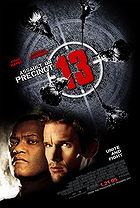 Posted : 16 years, 11 months ago on 6 July 2008 11:31
(A review of Assault on Precinct 13)
Posted : 16 years, 11 months ago on 6 July 2008 11:31
(A review of Assault on Precinct 13)Beck: "Your eyes are glazed. You been eatin' donuts?"
Assault on Precinct 13 is the contemporary remake of John Carpenter's 1976 action thriller of the same name. However, this is an uncommon instance of a remake that circumvents the customary cliché of being an identical duplicate of the original. This is austerely a remake by name and raw concept only; merely inhibiting an insignificant number of scenes perceptibly influenced by Carpenter's 1976 film. This remake is solid in terms of the attractive production values, the impressive visual style adapted by French director Jean-Francois Richet, the booming sound effects, the noisy score and the exciting action. Below the remarkably good-looking film, the script leaves much to be desired. Assault on Precinct 13 expands upon the original film in terms of plot points and character development; ultimately providing an extra added layer of disbelief at every turn. Instead of the adept, engaging character presented in the original we are shown a cluster of dumb characters implementing stupendous acts and delivering contrived dialogue.
The lone aspect of the film's plot that mirrors the original is the concept of a siege on a police precinct that is due to close its doors very soon. Aside from that, the plot is dissimilar. On a snowy New Years Eve, a skeleton crew are manning police precinct 13. Guilt-ridden former undercover narc Jake Roenick (Hawke) is undertaking a boring desk job at the precinct until the official closing. Due to a howling snow storm unfolding outside, a prison bus transporting a number of criminals is forced to divert to the station for the night. Among them is renowned recently arrested crime kingpin Marion Bishop (Fishburne). Isolated by the relentless blizzard, and cut off from communication with the outside world, the precinct is rapidly bordered by well-armed hostile forces. Roenick, burned-out and still filled with remorse, digs deep for his long-lost heroism and pride to hold the fort until dawn.
The creative team behind Assault on Precinct 13 had the right idea of altering aspects originally present in Carpenter's original. As a result, this is a re-imagining with potential. With such potential, the filmmakers could have created a superior movie. However the law of Hollywood remakes is that script flaws befall the rest of the production. In this case, almost every move made by the characters is stupid, illogical and unrealistic. In a claustrophobic situation such as this, no characters are ever granted half a brain. Despite the intense action and a few interesting moments, the script flaws can't be overlooked. Characters execute the most predictable acts in the book. Of course the cons aren't going to follow orders...that would be too unconventional for an action movie! Sticking to the original in that aspect would have been a benefit. There are also the glaring errors in logic. For example, people dismissing gunshots as fireworks...when fireworks can't even be set off in the blizzard?! There are several more instances, but I'd be spoiling a few mildly interesting scenes. It's also interesting to note that the original showed brutality to every character without a hint of sentimentality. In this remake, more characters survive and hence the film is less brutal.
French director Richet is unable to recapture the sense of claustrophobia and confinement. He's competent in filming solid action scenes but there isn't any sense of being cut off from the world as much as the feeling instilled by Carpenter. One of the film's redeeming features is the cast. Ethan Hawke is credible in the title role. Laurence Fishburne has always possessed the skill to be commanding and authoritative whenever appearing on the screen. He again flexes his great skill here. Gabriel Byrne is a sinister villain who's unfortunately underused and underdeveloped. Other characters include blatant racial stereotypes in the black characters, and a few despicably shown people for the cons.
Overall, Assault on Precinct 13 is a wasted opportunity. Instead of intelligence in its script, the filmmakers seemingly aimed to create solid and intense action scenes infused with incredible sound effects that will give your speakers a workout. Impressive considering the $20 million budget the filmmakers had to stretch. But this action is futile if there isn't anything behind it...in this case there are endless clichés, predictable events and contrived dialogue...not to mention flaws in geography and logic. It's violent, riveting, sometimes exciting and competently made, but ultimately very stupid!
5.2/10
 0 comments, Reply to this entry
0 comments, Reply to this entry
 Login
Login
 Home
Home 183 Lists
183 Lists 1670 Reviews
1670 Reviews Collections
Collections


